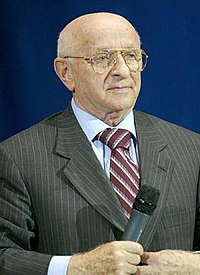Alexander Gomelsky: Difference between revisions
From Wikipedia, the free encyclopedia
Content added Content deleted
|
|
|||
| Line 109: | Line 109: | ||
|
*Honored Worker of Physical Culture of Russia: 1993 |
*Honored Worker of Physical Culture of Russia: 1993 |
||
|
*[[Olympic Order|Silver Olympic Order]]: 1998 |
*[[Olympic Order|Silver Olympic Order]]: 1998 |
||
|
*[[FIBA EuroStar]] (1998) |
|||
|
*[[Order of Merit (Ukraine)]]: 2003 |
*[[Order of Merit (Ukraine)]]: 2003 |
||
Latest revision as of 14:31, 13 August 2023
Russian basketball player and coach
 |
|
| Born | 18 January 1928 Kronstadt, Leningrad Oblast, RSFSR, Soviet Union |
|---|---|
| Died | 16 August 2005 (aged 77) Moscow, Russia |
| Nationality | Soviet / Russian |
| Playing career | 1945–1953 |
| Position | Point guard / shooting guard |
| Coaching career | 1949–1991 |
| 1945–1948 | ODO LenVO |
| 1949–1953 | Rīgas ASK |
| 1949–1952 | Spartak Leningrad (women) |
| 1953–1966 | Rīgas ASK |
| 1969–1980, 1985–1986 | CSKA Moscow |
| 1988–1989 | Tenerife AB |
| 1990–1991 | CSP Limoges |
| As a head coach | |
| Basketball Hall of Fame as coach | |
| FIBA Hall of Fame as coach | |
Alexander Yakovlevich Gomelsky (Russian: Александр Яковлевич Гомельский; 18 January 1928 – 16 August 2005) was a Russian professional basketball player and coach.[1] The Father of Soviet and Russian basketball, he was inducted into the Naismith Memorial Basketball Hall of Fame in 1995 and the FIBA Hall of Fame in 2007.
Alexander Gomelsky was awarded the Olympic Order by the International Olympic Committee in 1998. In 2008, he was named one of the 50 Greatest EuroLeague Contributors.
Club coaching career[edit]
Gomelsky began his coaching career in 1949, in Leningrad, with the women’s team of LGS Spartak. In 1953, he became the coach of Rīgas ASK, leading the team to three Soviet Union League titles (1955, 1957, 1958), and three consecutive European Champions Cups (EuroLeague), from 1958 to 1960.
In 1969, he was appointed the head coach of CSKA Moscow, leading the club to 10 Soviet Union national league championships (1970–1974, 1976–1980), 2 Soviet Union Cups (1972, 1973), and one European Champions Cup (EuroLeague) title in 1971. He also led the club to two more European Champions Cup (EuroLeague) finals, in 1970, and 1973.
He also coached in Spain and France shortly before the dissolution of the USSR.
National team coaching career[edit]
Gomelsky was the long-time head coach of the senior Soviet Union national team, leading them to 6 EuroBasket titles (1963, 1965, 1967, 1969, 1979, and 1981), 2 FIBA World Cup titles (1967, and 1982), and the Summer Olympic Games gold medal in 1988.
The Soviet team, with Vladimir Kondrashin as their coach, won their first Olympic gold medal that year, after a controversial game against the United States.
For merits in the development of sports and basketball was awarded:
Career achievements[edit]
Club competitions[edit]
National team competitions[edit]
Post coaching career[edit]

In his later years, Gomelsky was the president of the Russian Basketball Federation and CSKA Moscow. In 1995, he was inducted into the Naismith Memorial Basketball Hall of Fame. In 2007, he was enshrined into the FIBA Hall of Fame. In 2008, he was named one of the 50 Greatest EuroLeague Contributors.
The EuroLeague‘s annual Alexander Gomelsky EuroLeague Coach of the Year award is named after him, and so is Alexander Gomelsky Universal Sports Hall CSKA.[2]
Every year the Gomelsky Cup is organized by CSKA in honor of its legendary coach.
Personal life[edit]
The Gomelsky family has been a driving force behind development of the Soviet/Russian basketball. Gomelsky’s younger brother, Evgeny, is also a well-known basketball coach, and his son, Vladimir, also worked as a basketball player and coach. His son Gomelsky [Alexandre] ran a sports association school in his father name, leading to several female Olympic basketball players. He was survived by his four sons and four grandchildren. His wife Tatiana, also a basketball player and coach, died from cancer.
See also[edit]
Bibliography[edit]
References[edit]
External links[edit]

